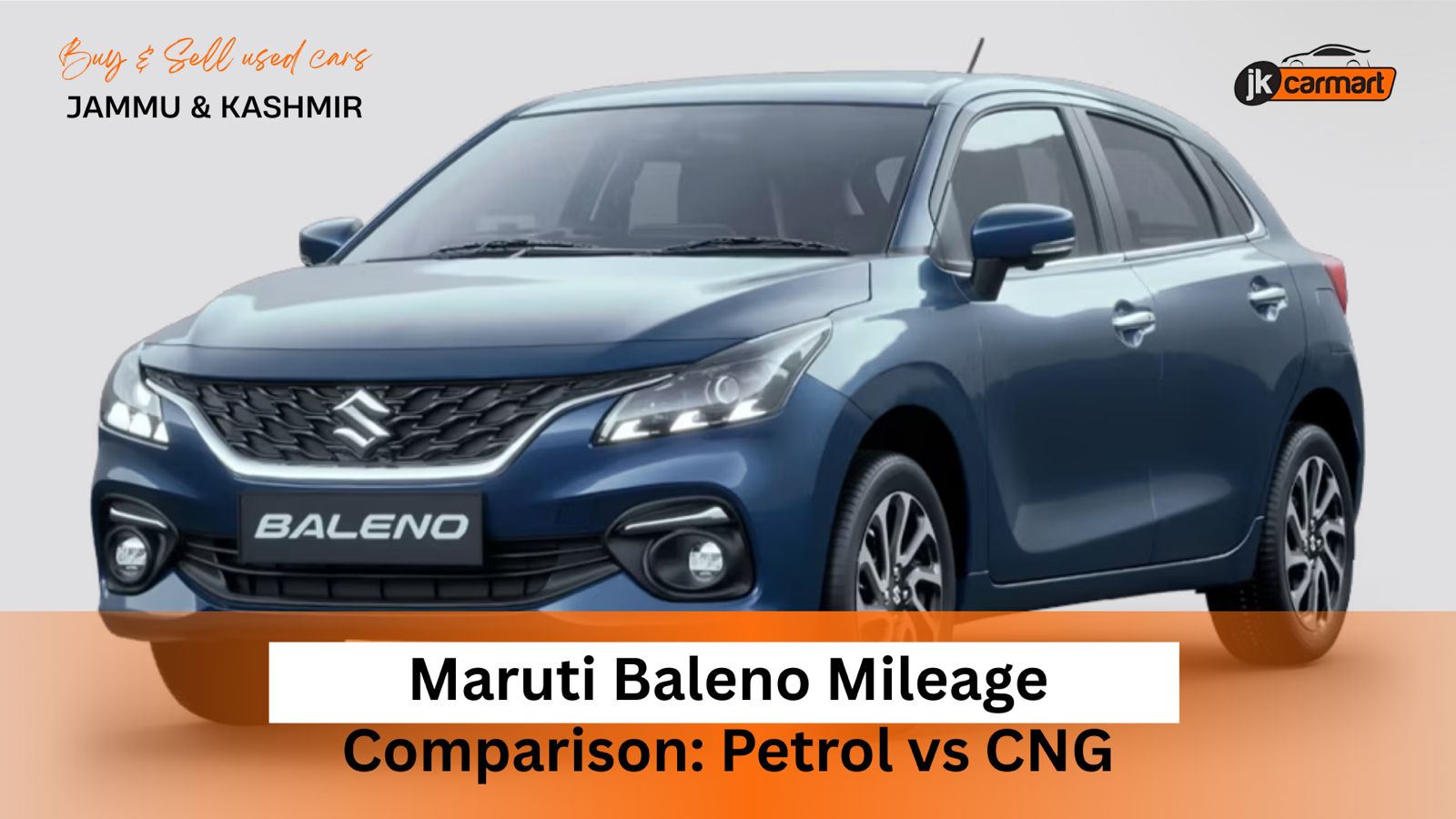Introduction
The Maruti Baleno is one of those cars you spot almost everywhere. It’s popular because it promises that mix of comfort and practicality that Maruti has built its name on.
But the catch is that in a country where fuel prices pinch almost every wallet, mileage can matter more than the touchscreen or alloy wheels.
So if you’re planning to buy a Maruti Baleno, the big question is obvious. Do you stick with the tried-and-tested petrol, or spend a little extra upfront for the CNG version? Let’s find that out.
Maruti Baleno Petrol vs CNG Performance
Maruti gives you two choices with the Baleno. A standard 1.2-litre K-Series petrol engine and a factory-fitted CNG.
| Variant | Power (PS) | Torque (Nm) | Transmission |
| Petrol | 88 PS | 113 Nm | Manual / AMT |
| CNG | 77.5 PS | 98.5 Nm | Manual |
The CNG loses about 10–12% of its power, which doesn’t seem like a big deal when you read it. But once you’re on the road, you can feel that the petrol just responds quicker, while the CNG takes a bit more effort.
Also Read: Everything You Need To Know About Car Valuation
Maruti Baleno Petrol vs CNG Mileage
In terms of running costs, CNG is the clear winner. For instance, if we take Delhi’s prices in September 2025, petrol is ₹94.77 a litre, while CNG is ₹76.09 a kilo. The price difference alone isn’t huge, but when you bring mileage into the picture, the gap really shows.
| Fuel Type | Price | Mileage | Cost per km |
| Petrol | ₹94.77/l | ~20 km/l | ₹4.74/km |
| CNG | ₹76.09/kg | ~24 km/kg | ₹3.17/km |
With CNG, you save around ₹1.57 per kilometre. That might not mean much, but it makes a huge difference when you look at the bigger picture.
For example, if you travel 1,500 km in a month, you’ll save about ₹2,350. At 2,000 km, the savings reach ₹3,100. And if you drive 2,500 km, then you’re almost ₹3,920 ahead.
The Break-Even Question
The CNG Baleno costs about ₹90,000 more than the petrol one. Now the question is, how long will it take for the fuel savings to cover that extra amount?
| Annual Distance | Annual Distance | Years to Recover Cost |
| 12,000 km | ~₹28,200 | 4.8 years |
| 15,000 km | ~₹37,600 | 3.8 years |
| 20,000 km | ~₹47,000 | 2.9 years |
If you drive a lot, around 20,000 km a year, the CNG Baleno makes more sense because you’ll recover the extra ₹90,000 in less than three years. After that, every kilometre is pure savings.
But if you don’t drive much, say only 12,000 km a year, it’ll take close to five years before you even cover the extra cost. In that case, the petrol Baleno is the smarter choice since you won’t really benefit much from CNG’s lower running cost.
Practical Comparison
Boot Space
The CNG Baleno gets a 55-litre tank in the boot, which eats up a large chunk of boot space. If you’re a family that often travels with big bags or lots of luggage, this can be a hassle. The petrol Baleno, on the other hand, gives you the full boot to use without any compromise.
Performance
The petrol engine feels stronger with 88 PS and 113 Nm as compared to the CNG’s 77–78 PS and 98–99 Nm. In city driving, the gap isn’t very noticeable. But once you’re on the highway or need to overtake quickly, the petrol pulls ahead with more ease. The CNG still does the job for daily runs, but petrol has that extra edge when you push it.
Maintenance
When it comes to service costs, there is not a big difference between the CNG and Petrol variants of the Maruti Baleno. The CNG needs a few extra checks, like spark plug replacements, which pushes its 5-year service cost to about ₹27,700. The petrol stays around ₹26,500. The difference is just ₹1,100 over five years, which is very small compared to how much you save on fuel with CNG.
Also Read: Second-Hand Cars: Save Money Without Compromising on Quality
Recommendations Based on Usage Patterns
Go for the CNG if:
- You drive more than 15,000 km a year
- You mostly drive in the city with heavy traffic.
- Saving on fuel matters more than getting maximum power.
- You care about the environment.t
- CNG stations are easy to access where you live
Stick with Petrol if:
- You drive less, under 12,000 km a year
- You spend a lot of time on highways and need quick overtakes
- Boot space is important for your trips.
- There are very few CNG stations in your area.
- You want the extra performance and smoother drive.





